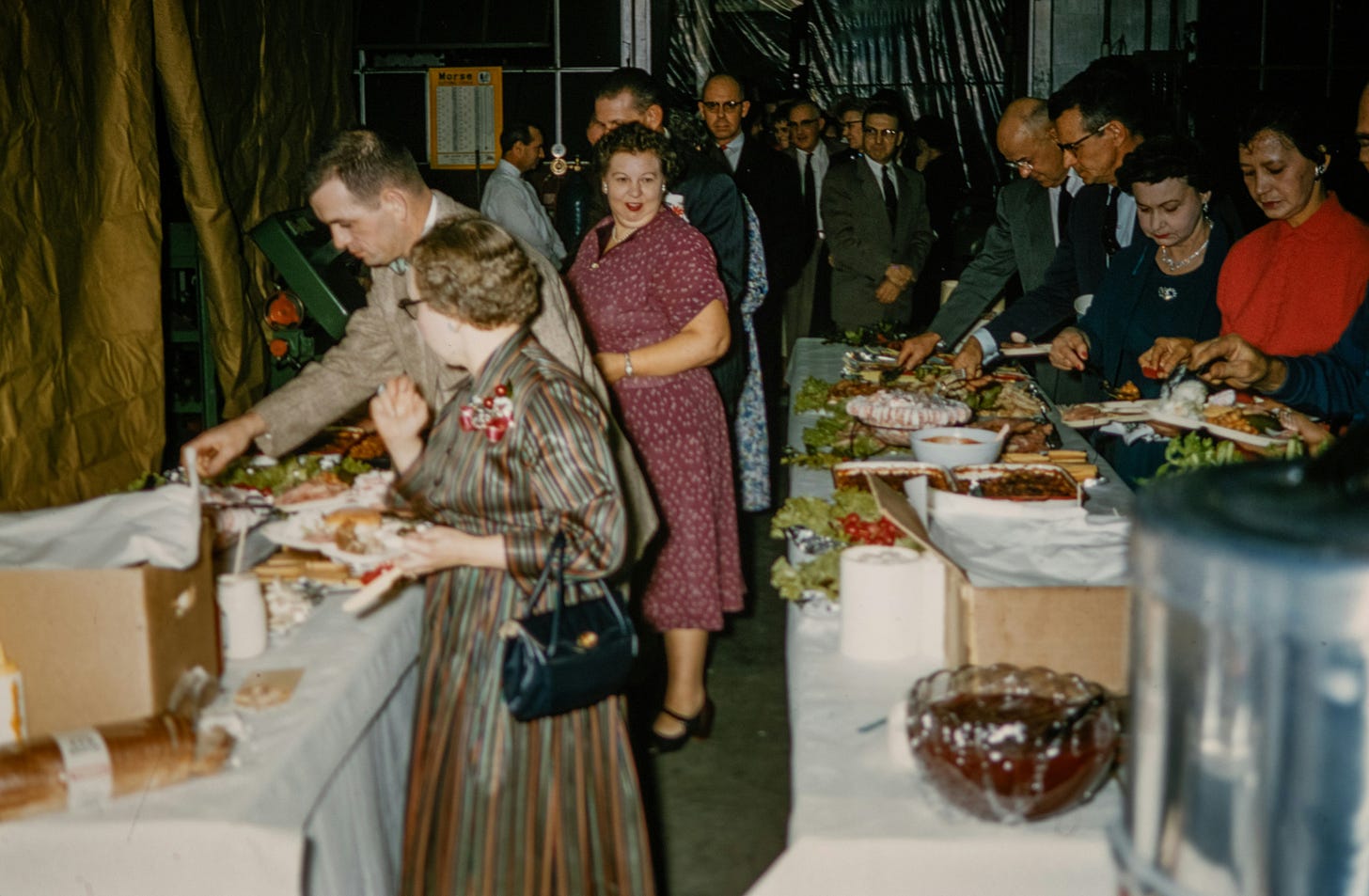All You Can Eat
Homily for Sunday, September 29, 2024: 26th Sunday in Ordinary Time
There is a phrase that gets tossed around sometimes –
Cafeteria Catholics.

It’s typically used in a negative way to suggest a less-than-committed Catholic. Wishy-washy. Catholics in Name Only.
But just for kicks, I’d like to take another look at this phrase. Turn it around, consider it from another perspective.
Because – let’s be honest - a Cafeteria seems like a pretty good metaphor for the Catholic Church.
I mean, we’re all gathered together today to partake in this sacred meal of the Paschal Sacrifice, a prefiguring of the Heavenly Banquet, the Wedding Feast of the Lamb. This image of a shared and sumptuous meal runs deep through our Scriptural Tradition.
Let’s imagine this table which our Good Shepherd has spread before us, maybe under a large pavilion tent over those verdant pastures.
We’ve got our table here – the Roman or Latin table. But we notice too, over there, the Alexandrian table, the Armenian, Byzantine, Chaldean, and Antiochene tables. There are actually a lot of churches contained under our One Big Holy Catholic and Apostolic Tent.
But turning back to our particular table, the Roman Catholic table, we see quite the spread of appetizers – rosaries and chaplets, novenas, devotions, more types of prayers than we can fit on those little hors d’oeuvre plates.
A selection of spiritual traditions; there’s Benedictine, Franciscan, Dominican, Carmelite, Trappist, Jesuit…. Theological traditions; Augustine, Aquinas, and Bonaventure, Bonhoffer, Edith Stein, John Paul II… to name just a few.
The point is, we’re looking at a big buffet table with a lot to choose from.
In the Gospel today, Jesus reminds us that “whoever is not against us is for us,” and that the “for us” category is probably a lot bigger than we realize.
So if we see someone whose plate doesn’t look quite like ours – if they’ve filled it up with something other than what we would choose – it doesn’t necessarily make them any less Catholic. It’s a big smorgasbord, and none of us can handle the whole thing.
Now, just like when we’re dining at one of those “All You Can Eat” buffet restaurants, we do want to be smart and mindful about what we put on our plate. We don’t want to load up on pasta, or spend all our time at the ice cream sundae bar. Or maybe we do, but hopefully we know better.
At the very least we should have the advice of our doctors, our parents, our spouses and friends, people looking out for our health and well-being and reminding us of the importance of a balanced diet.
As we navigate the offerings of the Catholic Buffet set before us, we have doctors, parents, and spouses as well (Yes, I’m looking to stretch this metaphor as far as it will go!)
We have Doctors of the Church – great theologians throughout history who guide Church teaching and doctrine. The Pope, along with the bishops and priests, are called our holy Fathers, taking a parental interest in our spiritual health.
So the Church offers us nutritional guidelines.
Go to Mass every Sunday and Holy Day of Obligation. Every day is great if we can manage it, but Sundays and Holy Days are set as the baseline to nourish the soul and keep it going, spiritually.
Receive Communion at least once a year. Again, receiving whenever we attend Mass is a good practice when we’re able to. Receiving the Body of Christ is the spiritual protein that gives the soul the energy to do God’s will in the World
And receive the Sacrament of Reconciliation at least once a year. More is better, as often as we need. Confession is like the spiritual roughage – we may not like it that much but it’s good for scrubbing out the gunk that collects in the soul.
But as Saint James reminds us in the second reading that we still have to watch out for the junk food imported from the outside world. Fatty rich fare that will work against our spiritual health.
What James talks about here comes down to another vital nutrient in our spiritual diet: respect for the dignity of human life. Putting human welfare above concerns of wealth and prosperity. James serves it up here as respect for workers and a fair wage for their labors. It’s an old and time-honored recipe from Moses and the Prophets, which James has whipped up to bring to the Apostolic pot-luck.
This respect for human dignity comes in a few other different servings as well. Some serve it up as a fight for the rights of workers while others fight for the rights of the unborn. Some offer up the Works of Mercy, some work at keeping this world God gave us in good condition for future generations.
It’s all part of the work of spreading God’s Kingdom. Each of us has our small part to play, and none of us has to do it exactly the same as anyone else. We can diverge in our approaches and methods – we can agree with a particular moral principle but disagree about how a particular group, organization, or politician tries to apply that principle.
Anyone working in support of the common good is doing God’s work. And whoever is not working against us is with us.

